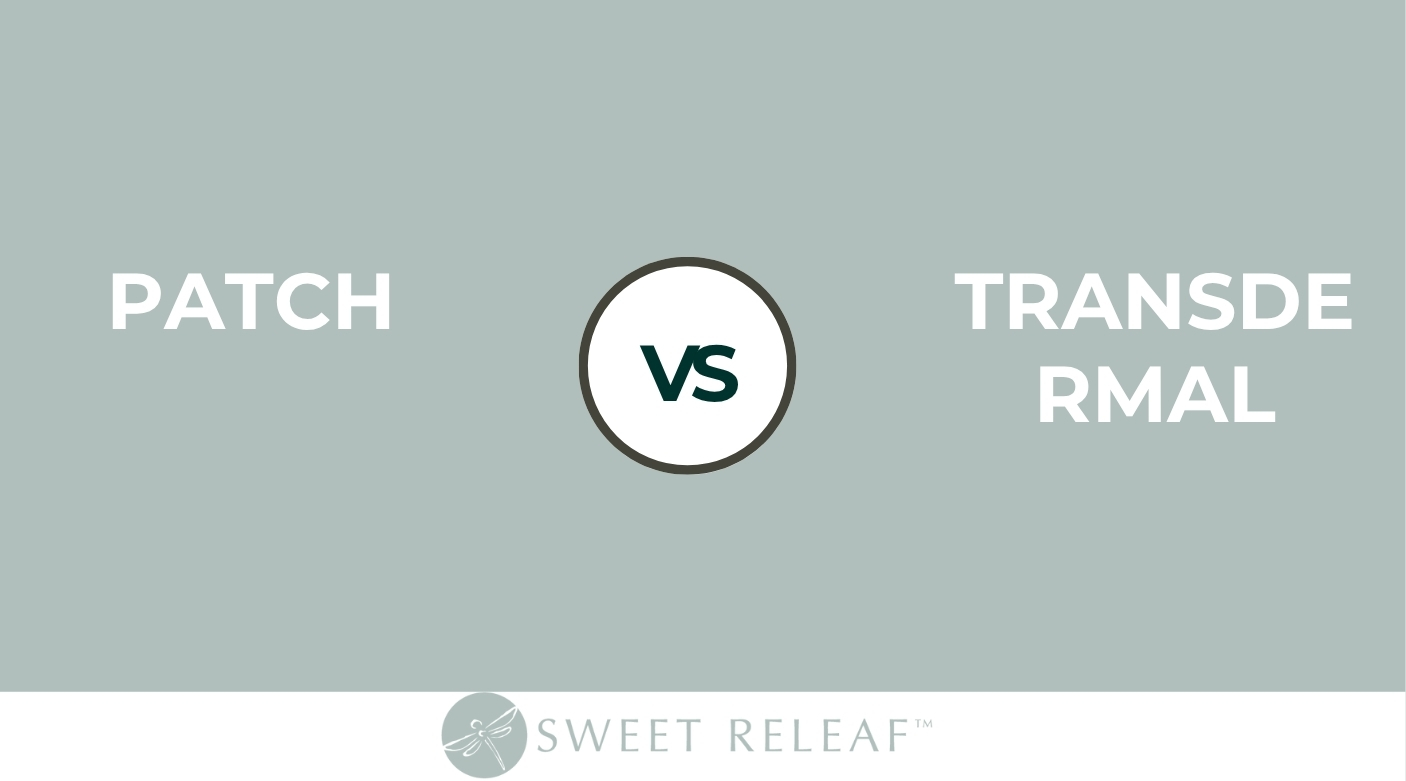Topical cannabis products like THC and CBD creams usually don’t enter your bloodstream, but in rare cases, trace amounts can linger.
Learn how your body processes them, whether they show up on drug tests, and what to expect based on how you use them.
Before you apply that cream or balm, here’s what you should know: even though most topicals are formulated for localized relief, not to enter the bloodstream, there are exceptions.
If you’re using them daily, using the wrong formulation, or getting ready for a drug test, that “safe” cream could leave a trace.
How it may differ by who you are:
- Job seekers: Topicals are usually safe, but choose lab-tested, non-transdermal options; some THC may build up with regular use.
- Cautious first-time users: Look for non-psychoactive, emulsion-based formulas to avoid unintended effects or systemic absorption.
- Athletes: Some leagues test for all THC, even trace amounts from creams. Avoid full-spectrum or transdermal formulations.
- Chronic pain patients: Daily use of high-THC topicals might slowly store cannabinoids in fat cells, though still safer than ingestibles.
- Seniors: Most topicals offer fast, gentle relief without lingering side effects, but talk to your doctor if you’re on multiple medications.
We’ve formulated our topicals specifically not to cross into your bloodstream. We use whole-plant, high-THC emulsions that stay skin-deep, relieving pain without psychoactive effects or drug test risk.
Our Comfort+ Extra Strength Body Butter is a popular choice for those who need potent relief without systemic worries.
If you’re looking for a deeper dive into how THC and CBD behave in the body, what the risks really are, and what you can do about them, keep reading.
Can THC or CBD from Topicals Get Into Your System?
What “Topical” Really Means

When we talk about cannabis topicals, we’re usually referring to creams, lotions, or body butters applied directly to the skin for localized relief.
But not all topicals are created equal, and that distinction matters beyond what most people realize.
Topicals like Sweet Releaf’s body butters are formulated to interact with cannabinoid receptors in your skin and muscles.
They work fast, deliver targeted pain relief, and, crucially, do not enter your bloodstream. That means no psychoactive effects and no systemic exposure, even when high-THC ingredients are involved.
By contrast, transdermal products are engineered to cross the skin barrier and enter your circulation.
These often come in patch form and may deliver cannabinoids like THC or CBD into the bloodstream slowly over time, much like a nicotine patch.
So the key distinction is this:
- Topical = localized relief. Acts where you apply it. No “high.” Minimal systemic risk.
- Transdermal = systemic delivery. Cannabinoids enter your body. Possible drug test detection.
Sweet Releaf topicals are emulsions, not patches. That means they’re optimized for deep skin penetration, not bloodstream absorption.
Our products stay where you put them, working hard on your body, not through it.
When Topicals Might Enter Your System
Still, there are exceptions. Even a topical can act more like a transdermal under certain conditions.
For instance, products labeled as “transdermal” or containing penetration enhancers, like alcohol or certain essential oils, are specifically designed to deliver cannabinoids through the skin barrier.
These can, and often do, result in detectable THC or CBD levels in blood or urine tests.
Other risk factors include:
- Applying to large areas of the body
- Using on broken, thin, or inflamed skin
- Daily use of high-THC products over time
In rare cases, even trace amounts of THC from a poorly formulated product can slowly accumulate in fat tissue, especially with prolonged use. While this is uncommon with true topicals, it’s not impossible, particularly in an unregulated market where labeling may be inaccurate.
That’s why it’s so important to choose wisely. Sweet Releaf’s emulsions are crafted specifically to stay skin-deep, giving you potent, non-psychoactive pain relief without systemic risk.
No patches, no mystery ingredients, only clean, high-THC relief you can trust.
How Long Do Topical THC and CBD Stay in Your Body?
If It Doesn’t Enter the Bloodstream, What’s the Concern?
Here’s a myth worth busting: “Topicals are always safe for drug tests.” While this is mostly true for products like Sweet Releaf’s, which are non-transdermal, it’s not a guarantee across the board.
Some formulations labeled as topicals may contain absorption enhancers or THC concentrations high enough to pose a risk, especially with frequent use.
If you’re applying a full-spectrum cream every day, even one with only 1% THC, trace amounts can potentially build up in your fat cells over time.
This is particularly important for people preparing for drug tests. Even if you feel no psychoactive effect, your body may still retain minute amounts of THC, especially if:
- The formulation includes transdermal agents (like alcohols or DMSO)
- You apply to large areas or broken skin
- You use high-potency formulas frequently without a break
When products are not accurately labeled, or when a cream marketed as a topical functions more like a transdermal, the line between skin-deep and systemic gets blurry.
Elimination Timeline for Transdermal vs. Topical

Let’s break down how long cannabinoids might linger depending on product type.
- Topicals: With true non-transdermal topicals like Sweet Releaf’s emulsion butters, the effects typically last 2–6 hours. These products are formulated not to cross into your bloodstream, so there’s usually nothing to “eliminate.” Systemic trace? Nearly zero.
- Transdermals: These are a different story. Patches or creams designed to cross into circulation can leave detectable THC or CBD in your body for anywhere from 2 days up to 3 weeks. Why the range? Because cannabinoids like THC are fat-soluble, they get stored in body fat and are released slowly, especially with repeated use.
Variables That Affect How Long THC/CBD Stay
Even if you’re using a transdermal product, the timeline for elimination varies from person to person. Here are the most influential factors:
- Frequency of use: Daily use allows cannabinoids to accumulate in fat tissue, making them detectable longer.
- Body fat percentage & metabolism: The more fat cells you have, the more storage space for THC. Slower metabolism = slower clearance.
- Liver function: The liver is key to metabolizing cannabinoids. Impaired liver function can delay elimination.
- Application method: Was it a patch? A lotion with absorption enhancers? Or an emulsion like ours? This determines how much, if any, THC enters your bloodstream.
We formulate with intention. Our emulsions are rich in THC for pain relief but remain non-systemic, giving you targeted, reliable support without the risk of lingering traces.
No guessing games. Only relief where you need it, when you need it.
Real People, Real Concerns, What You Need to Know
Why Some Users Still Fail Drug Tests
Despite doing everything “right,” some people still fail drug tests after using cannabis topicals, and the reason is not always clear until you look closer.
Take the story of a job applicant who applied full-spectrum CBD lotion nightly for shoulder pain. The product is claimed to be non-psychoactive and legal.
Yet, weeks into daily use, they failed a pre-employment urine screen. Why?
It comes down to three critical issues:
- Labeling errors: Many over-the-counter topicals lack third-party testing or misrepresent THC content.
- Systemic accumulation, even trace amounts of THC in a daily-use product, can build up in fat cells, especially with high body fat percentage or slow metabolism.
- Transdermal misidentification: Some creams marketed as “topicals” contain absorption enhancers that push cannabinoids into the bloodstream unintentionally.
This is why Sweet Releaf places such a high priority on product integrity.
Our topicals are made with full-spectrum cannabis, yes, but they are emulsions designed for localized pain relief, not transdermal delivery. No psychoactive effects. No unwanted surprises
How This Differs Based on Who You Are
Cannabis topicals affect people differently depending on who they are, how they use them, and what their goals (or risks) are.
Whether you’re applying a cream to ease post-workout soreness or navigating a high-stakes drug test, the same product could have very different implications.
Here’s what to consider based on your situation:
Job Seekers Concerned About Drug Tests
If you’re in the middle of a hiring process, you can’t afford surprises. Even if you’re using cannabis legally and responsibly, a positive drug test can derail your opportunity.
- Stick to trusted brands like Sweet Releaf, which clearly label their products as non-transdermal and test every batch for cannabinoid content.
- Avoid anything labeled “transdermal,” “patch,” or “systemic” delivery.
- Look for third-party lab results verifying THC content and non-psychoactivity.
Cautious First-Time Users
If you’re new to cannabis and understandably cautious, topicals are a gentle, non-intoxicating way to start. But clarity is key.
- Choose low-dose, full-spectrum products that clearly say “non-psychoactive” and “non-transdermal.”
- Start small. A fingertip of Sweet Releaf’s Comfort+ on one sore joint is all it takes to feel the difference.
- Don’t worry, you won’t feel “high.” Only better.
Athletes Subject to Testing
From weekend warriors to elite competitors, many athletes are subject to strict anti-doping rules. Even trace THC can be flagged in some leagues.
- Avoid full-spectrum or high-THC products if you’re in a zero-tolerance environment.
- Check if your topical includes any transdermal agents or claims systemic effects.
- If testing is not a concern, Sweet Releaf’s emulsions offer rapid recovery support without psychoactive effects.
Chronic Pain Patients Using Daily
Pain does not take days off, and neither do you. But if you’re applying cannabis topicals daily, it’s worth understanding how your body stores and processes cannabinoids.
- Daily use of even trace-THC topicals can lead to accumulation in fat cells, especially in higher-BMI individuals.
- Stick to non-transdermal emulsions like Sweet Releaf’s, which deliver powerful relief without crossing into the bloodstream.
- Compared to edibles or tinctures, topicals remain the safer route for long-term management without systemic side effects.
Seniors Curious About Lingering Effects
Many older adults are discovering the benefits of cannabis for arthritis, joint stiffness, or nerve pain, but they’re also cautious about side effects or medication interactions.
- Topicals are ideal: fast relief, no buzz, and minimal systemic absorption.
- Emulsion-based formulas like Sweet Releaf’s absorb cleanly and feel luxurious on the skin.
- Still, if you’re on blood thinners or other medications, consult your pharmacist or doctor to be safe.
Pain, after all, is personal. That’s why we make it our mission at Sweet Releaf to support your lifestyle, not interrupt it.
Whether you’re managing recovery, seeking comfort, or curious about the possibilities, there’s a safe, effective way to find relief that fits your life.
How to Stay Safe (and Get the Relief You Need)
Topical cannabis can be a game-changer, but only if you know what you’re using and how it works.
While most people can use THC or CBD topicals with zero issues, certain formulations, usage patterns, or testing scenarios can turn relief into a risky gamble.
Here’s how to keep it safe and effective.
Use Only Non-Transdermal, Full-Spectrum Products That Are Lab-Tested
There’s a difference between a cream that feels good and one that works without consequences.
We formulate our topicals using full-spectrum THC, the cannabinoid most effective for pain, but we do it in a way that stays where it’s needed: on the surface.
- Our emulsion-based topicals don’t cross into the bloodstream, which dramatically reduces the risk of THC showing up in a drug test.
- Every batch is third-party lab tested for cannabinoid content, so you always know exactly what you’re putting on your body.
- No mystery. No additives that “enhance absorption” into places you don’t want THC to go.
We stay skin-deep, on purpose.
Know What You’re Buying
The cannabis industry is full of well-meaning brands… and as many gimmicks.
A lot of “CBD-only” creams either don’t contain enough active ingredients to be effective or rely on misleading labeling to appear compliant while sneaking in enough THC to cause issues.
- Avoid products that are vague about their ingredients or hide behind trendy buzzwords.
- Choose handcrafted, clearly labeled products with formulation transparency.
- Look for mentions of “non-transdermal” and “non-psychoactive” if you’re risk-averse.
Sweet Releaf tells you what’s in every jar and why it’s there, because your health deserves honesty.
When in Doubt, Test at Home
If you’ve got a drug test coming up or just want peace of mind, there’s no shame in being proactive.
- At-home drug tests are widely available and affordable.
- If you’re unsure how your body will respond, it’s wise to stop using even low-risk topicals 7–10 days before any critical screening.
- And remember, a product that works doesn’t need to enter your bloodstream to relieve your pain.
We’ve spent years crafting our products to work where it matters and only where it matters.
That’s how we honor the trust you place in us, and it’s why people come back to Sweet Releaf again and again when other solutions fall short.
Sweet Releaf, Relief You Can Trust, Without the Risk
Why Our Topicals Are Different
We’re not only another brand chasing trends. We’re a family-owned company committed to providing pain relief that actually works, without putting your health or job at risk.
- We don’t use transdermal patches. That means no systemic delivery, no drug test worries, and no accidental “high.”
- Our body butters are emulsion-based, allowing for deeper skin absorption without crossing into your bloodstream. They feel luxurious, absorb quickly, and don’t leave behind a greasy mess.
- Each formula features high-potency THC for real pain relief, balanced with enough CBD for support, and always non-psychoactive.
This is not an experiment. It’s plant medicine that respects your body, your life, and your peace of mind.
Designed for Life, Not the Lab
Our customers are not lab rats. They’re nurses with aching backs, hikers with sore knees, and grandmothers who want to garden without groaning.
They’re people like you and me, tired of pills, tired of empty promises, and ready for something real.
Sweet Releaf is not only a product. It’s a return to what healing can be: simple, effective, and natural.
Our mission is to help you stay active, stay independent, and stay connected to the life you love, without pharmaceuticals dragging you down.
Try It Where It Hurts
If you’re struggling with deep, stubborn pain, try our Comfort+ Extra Strength Body Butter, a customer favorite for chronic conditions like arthritis, surgery recovery, or overuse injuries.
Prefer something cooling after a workout or warming on a stiff neck? Explore our Ayurvedic roll-ons, crafted with ancient herbal wisdom for targeted comfort.
We’re not trying to be trendy. We’re here to be useful.
Pain is the body’s way of asking for attention, and how we respond matters. Sweet Releaf believes in responding with care, clarity, and real relief you can feel. Because you deserve to live pain-free, without tradeoffs.
And we’re honored to help make that possible.
FAQs
How long does CBD THC cream last in your system?
If it’s a true topical like Sweet Releaf’s, it doesn’t enter the system at all, so there’s nothing to metabolize or excrete. If it’s transdermal, expect traces to linger for 2–20 days, depending on your body.
Can THC leave your body in 3 days?
Not likely, especially not if it’s stored in fat tissue. With consistent use or higher doses, it can take up to 30 days or more to fully clear.
How long do CBD/THC effects last?
Topicals typically relieve pain for 2 to 6 hours. Systemic effects from transdermals or edibles may last longer, depending on dose, method, and your body’s metabolism.
How long does a CBD THC gummy stay in your urine?
That’s a different delivery method entirely. Gummies are ingested and processed through the liver, making THC detectable in urine for up to 30 days, especially in regular users.
This is why it’s key to know what you’re using and how it works. We’re transparent about every ingredient and every mechanism of action.
We don’t cut corners, and we don’t make claims we can’t stand behind.
Our goal is nor to sell you a miracle cream. It’s to help you feel better, without putting your job, your health, or your peace of mind at risk.




